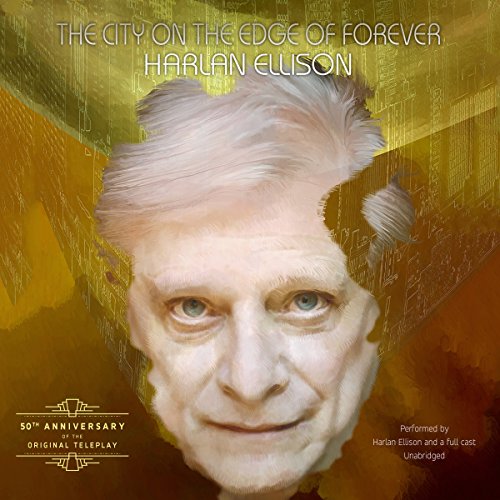
The City on the Edge of Forever (Full-Cast Audio Theater)



Made with excellent craftsmanship and high quality materials slim fit style.
Protects your mobile phone against scratches, dirt, fingerprints and other daily damages.
Express yourself by personalising your phone and making it stand out.
Allows easy access to all buttons, controls and ports.
Applying Most Advanced Printing Technology in the Market
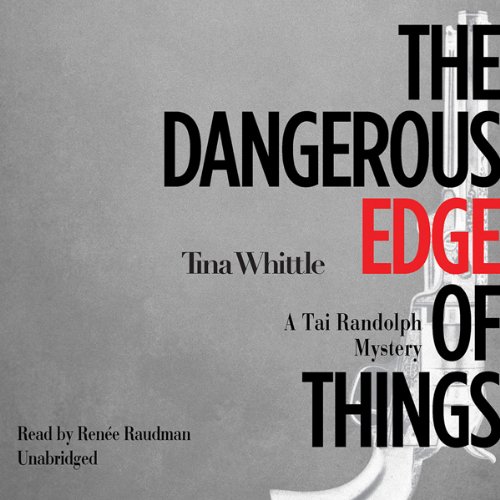
Tai Randolph thinks inheriting a Confederate-themed gun shop is her biggest headache-until she finds a murdered corpse in her brother’s driveway. Even worse, her supposedly respectable brother begins behaving in decidedly non-innocent ways, like fleeing to the Bahamas and leaving her with both a homicide in her lap and the pointed suspicions of the Atlanta Police Department directed her way. Suddenly, she has to worry about clearing her own name, not just that of her wayward sibling.
Complicating her search for answers is Trey Seaver, field agent for Phoenix, an exclusive corporate security firm hired to investigate the crime. Seaver is fearless, focused, and utterly impervious to bribes, threats, and clever deceptions. Still in recovery from the car accident that left him cognitively and emotionally damaged, Seaver has constructed a world of certainty and routine. He has powerful people to answer to, and the last thing he wants is an unpredictable stranger “detecting” on Phoenix turf.
Tai’s inquiry leads her from the cold-eyed glamour of Atlanta’s adult-entertainment scene to the gilded treachery of Tuxedo Road. Potential suspects abound, including violent stalkers, vengeful sisters, and a paparazzo with a taste for meth. But it takes another murder-and threats to her own life-to make Tai realize that to solve this crime she has to trust the most dangerous man she’s ever met.
A Poisoned Pen Press Mystery
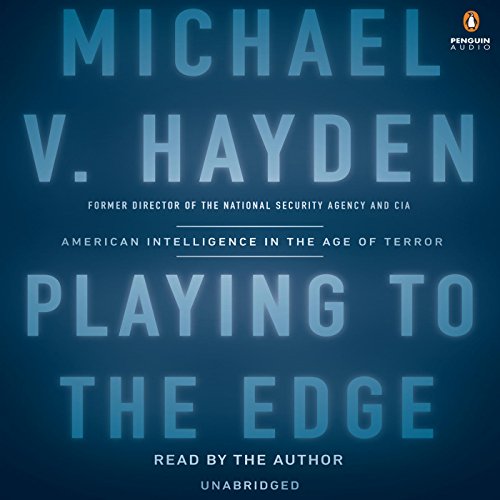
An unprecedented high-level master narrative of America’s intelligence wars from the only person ever to helm both the CIA and NSA, at a time of heinous new threats and wrenching change.
For General Michael Hayden, playing to the edge means playing so close to the line that you get chalk dust on your cleats. Otherwise, by playing back, you may protect yourself, but you will be less successful in protecting America.
“Play to the edge” was Hayden’s guiding principle when he ran the National Security Agency, and it remained so when he ran the CIA. In his view, many shortsighted and uninformed people are quick to criticize, and this book will give them much to chew on but little easy comfort; it is an unapologetic insider’s look told from the perspective of the people who faced awesome responsibilities head on, in the moment.
How did American intelligence respond to terrorism, a major war, and the most sweeping technological revolution in the last 500 years? What was the NSA before 9/11, and how did it change in its aftermath? Why did the NSA begin the controversial terrorist surveillance program that included the acquisition of domestic phone records? What else was set in motion during this period that formed the backdrop for the infamous Snowden revelations in 2013?
As director of the CIA in the last three years of the Bush administration, Hayden had to deal with the rendition, detention, and interrogation program as bequeathed to him by his predecessors. He also had to ramp up the agency to support its role in the targeted killing program that began to dramatically increase in July 2008. This was a time of great crisis at the CIA, and some agency veterans have credited Hayden with actually saving the agency. He himself won’t go that far, but he freely acknowledges that the CIA helped turn the American security establishment into the most effective killing machine in the history of armed conflict.
For 10 years, then, General Michael Hayden was a participant in some of the most telling events in the annals of American national security. General Hayden’s goals in writing this book are simple and unwavering: no apologies. No excuses. Just what happened. And why. As he writes, “There is a story here that deserves to be told, without varnish and without spin. My view is my view, and others will certainly have different perspectives, but this view deserves to be told to create as complete a history as possible of these turbulent times. I bear no grudges, or at least not many, but I do want this to be a straightforward and readable history for that slice of the American population who depend on and appreciate intelligence but who do not have the time to master its many obscure characteristics.”
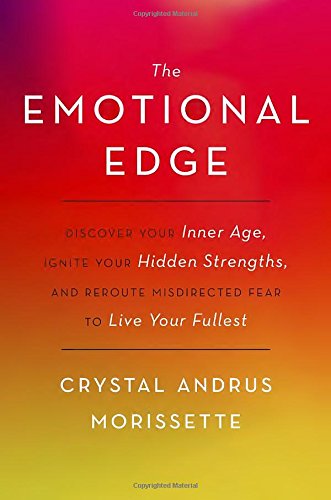
Ever Feel Like Your Inner Age Doesn’t Match Your Outer One?
The Emotional Edge empowers you to stop knee-jerk reacting in ways that hurt and instead start expanding your life to become the greatest expression of you possible. Once you know your Emotional Age, you can take any needed steps to become more fully grown-up so you stop giving your power away. You’ll now see when you’re inadvertently sabotaging yourself and understand why. You’ll be able to channel your fear and anger into courage and willingness, and live your best life without guilt, shame, or blame. Never feel like a victim of circumstance, genetics, or your past again, instead dive in and discover:
–The EA quiz to see whether you’re a Parent, Child, or Adult ‘archetype’—and what to do about it
–Learn your communication scale and style: moving from passive or aggressive to appropriately assertive
–Tune into your unique needs mentally, emotionally, and physically
–Rewrite your relationship, work, and bliss paths
Instead of letting your emotions get the best of you, now it’s time to get the best of them!
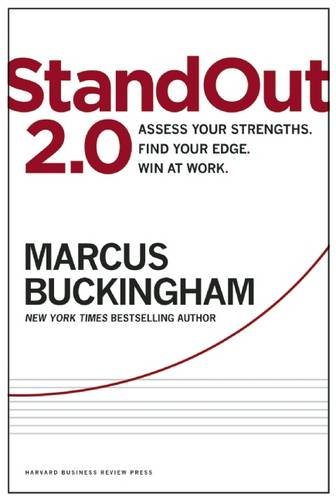
The Groundbreaking Strengths Assessment from the Leader of the Strengths Revolution
In the years since the publication of First, Break All the Rules and Now, Discover Your Strengths, millions have come to the simple but powerful realization that to get the most out of people, you must build on their strengths. And yet, as Marcus Buckingham astutely points out, though the strengths-based approach is now conventional wisdom, the tools and systems inside organizationsperformance appraisals, training programs, and succession planning systemsremain stubbornly remedial and exclusively focused on measuring skills, finding gaps, and attempting to plug them. It’s a crisis for individuals and organizations, with management ideas and everyday practice utterly out of sync.
That’s about to change. StandOut 2.0 is a revolutionary book and tool that enables you to identify your strengths, and those of your team, and act on them. The original edition of StandOut provided top-notch insights from one of the world’s foremost authorities on strengths, as well as access to a powerful, cutting-edge online assessment tool. Now, in addition to a much more powerful assessment and a robust report on your most dominant strengths, StandOut 2.0 contains or provides access to:
A StandOut profile, easily customized and exported, that you can use to present the very best of yourself to your team and your company
Your own Personalized Strengths Channel, which, after you’ve taken the 15-minute assessment, will send you a weekly tip, insight, or technique to help you do your best work this week
An entire strengths-based performance management system, including check-in and evaluation tools to track your progress, and that of your team
And much more. StandOut 2.0 is your indispensable guide for building on your strengths to further your careerand help your team and organization win.

Edge of Eternity is the sweeping, passionate conclusion to Ken Follett’s extraordinary historical epic, The Century Trilogy.
Throughout these books, Follett has followed the fortunes of five intertwined families – American, German, Russian, English, and Welsh – as they make their way through the twentieth century. Now they come to one of the most tumultuous eras of all: the enormous social, political, and economic turmoil of the 1960s through the 1980s, from civil rights, assassinations, mass political movements and Vietnam to the Berlin Wall, the Cuban Missile Crisis, presidential impeachment, revolution – and rock and roll.
East German teacher Rebecca Hoffman discovers she’s been spied on by the Stasi for years and commits an impulsive act that will affect her family for the rest of their lives. George Jakes, the child of a mixed-race couple, bypasses a corporate law career to join Robert F. Kennedy’s Justice Department, and finds himself in the middle not only of the seminal events of the civil rights battle, but a much more personal battle of his own. Cameron Dewar, the grandson of a senator, jumps at the chance to do some official and unofficial espionage for a cause he believes in, only to discover that the world is a much more dangerous place than he’d imagined. Dimka Dvorkin, a young aide to Nikita Khrushchev, becomes a prime agent both for good and for ill as the United States and the Soviet Union race to the brink of nuclear war, while his twin sister, Tania, carves out a role that will take her from Moscow to Cuba to Prague to Warsaw – and into history.
As always with Follett, the historical background is brilliantly researched and rendered, the action fast-moving, the characters rich in nuance and emotion. With the hand of a master, he brings us into a world we thought we knew but now will never seem the same again.
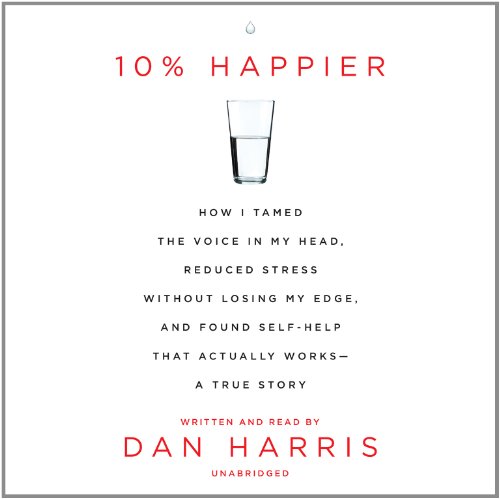
[*Read by the author – Dan Harris]
Nightline anchor Dan Harris embarks on an unexpected, hilarious, and deeply skeptical odyssey through the strange worlds of spirituality and self-help and discovers a way to get happier that is truly achievable. — 10% Happier takes readers on a ride from the outer reaches of neuroscience to the inner sanctum of network news to the bizarre fringes of America’s spiritual scene and leaves them with a takeaway that could actually change their lives. — After having a nationally televised panic attack on Good Morning America, Dan Harris knew he had to make some changes. A lifelong nonbeliever, he found himself on a bizarre adventure involving a disgraced pastor, a mysterious self-help guru, and a gaggle of brain scientists. Eventually, Harris realized that the source of his problems was the very thing he always thought was his greatest asset: the incessant, insatiable voice in his head, which had both propelled him through the ranks of a hypercompetitive business and also led him to make the profoundly stupid decisions that provoked his on-air freak-out. — We all have a voice in our head. It’s what has us losing our temper unnecessarily, checking our email compulsively, eating when we’re not hungry, and fixating on the past and the future at the expense of the present. Most of us would assume we’re stuck with this voice–that there’s nothing we can do to rein it in–but Harris stumbled upon an effective way to do just that. It’s a far cry from the miracle cures peddled by the self-help swamis he met; instead, it’s something he always assumed to be either impossible or useless: meditation. After learning about research that suggests meditation can do everything from lower your blood pressure to essentially rewire your brain, Harris took a deep dive into the underreported world of CEOs, scientists, and even marines who are now using it for increased calm, focus, and happiness.
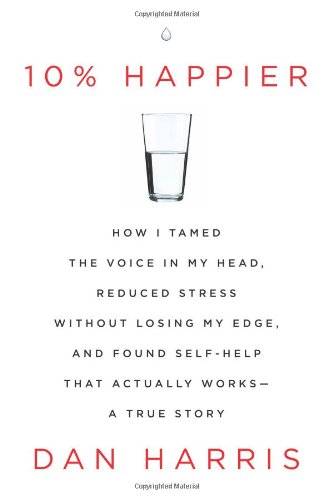
Nightline anchor Dan Harris embarks on an unexpected, hilarious, and deeply skeptical odyssey through the strange worlds of spirituality and self-help, and discovers a way to get happier that is truly achievable.
After having a nationally televised panic attack on Good Morning America, Dan Harris knew he had to make some changes. A lifelong nonbeliever, he found himself on a bizarre adventure, involving a disgraced pastor, a mysterious self-help guru, and a gaggle of brain scientists. Eventually, Harris realized that the source of his problems was the very thing he always thought was his greatest asset: the incessant, insatiable voice in his head, which had both propelled him through the ranks of a hyper-competitive business and also led him to make the profoundly stupid decisions that provoked his on-air freak-out.
We all have a voice in our head. It’s what has us losing our temper unnecessarily, checking our email compulsively, eating when we’re not hungry, and fixating on the past and the future at the expense of the present. Most of us would assume we’re stuck with this voice – that there’s nothing we can do to rein it in – but Harris stumbled upon an effective way to do just that. It’s a far cry from the miracle cures peddled by the self-help swamis he met; instead, it’s something he always assumed to be either impossible or useless: meditation. After learning about research that suggests meditation can do everything from lower your blood pressure to essentially rewire your brain, Harris took a deep dive into the underreported world of CEOs, scientists, and even marines who are now using it for increased calm, focus, and happiness.
10% Happier takes readers on a ride from the outer reaches of neuroscience to the inner sanctum of network news to the bizarre fringes of America’s spiritual scene, and leaves them with a takeaway that could actually change their lives.
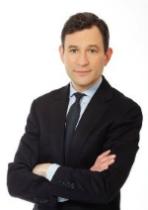 Dan Harris
Dan Harris  Gretchen Rubin Gretchin Rubin interviews Dan Harris about 10% Happier
Gretchen Rubin Gretchin Rubin interviews Dan Harris about 10% Happier
I met Dan Harris when a mutual friend suggested that we’d enjoy talking about habits, happiness, and meditation. We had a great discussion, and in fact, Dan was one of several people who inspired me to try meditating. 10% Happier is his hilarious, thought-provoking book about his experiences with meditation. I knew Dan had done a lot of thinking about the relationship of habits and happiness, and how to use habits to foster happiness, so I was eager to hear what he had to say.
Gretchen: What’s a simple habit that consistently makes you happier?
Dan: I never in a million years thought I’d be the type of person who’d say this, but my answer is … meditation.I had always assumed that meditation was for robed gurus, acid-droppers, and people who keep yurts in their backyard. But then I heard about the explosion of scientific research that shows the practice has an almost laughably long list of health benefits, from lowering your blood pressure to boosting your immune system to essentially rewiring your brain for happiness. I started with five minutes a day, and very quickly noticed three benefits: 1. Increased focus, 2. A greater sense of calm, and 3. A vastly improved ability to jolt myself out of rumination and fantasies about the past or the future, and back to whatever was happening right in front of my face.Over time (I’ve now been at it for about four years and do 35 minutes a day), an even more substantial benefit kicked in: I created a different relationship to the voice in my head. You know the voice I’m talking about. It’s what has us reaching into the fridge when we’re not hungry, checking our e-mail while we’re in conversation with other people, and losing our temper only to regret it later. The ability to see what’s going on in your head at any given moment without reacting to it blindly—often called “mindfulness”—is a superpower.I’m certainly not arguing that meditation is a panacea. I still do tons of stupid stuff – as my wife will attest. But the practice has definitely made me happier, calmer, and nicer.
Gretchen: What’s something you know now about forming healthy habits that you didn’t know when you were 18 years old?
Dan: A neuroscientist friend of mine once told me, “The brain is a pleasure-seeking machine. ” Usually, we do what makes us feel good. What I know now about habit formation that I didn’t know then is that I generally cannot create or break habits unless there is compelling self-interest involved.So, for example, with meditation, I was motivated to start the habit by the science that says it’s good for you—and I’ve been able to maintain it because, while the act of meditating is often quite tough, the “off-the-cushion” benefits are so readily apparent to me.
Gretchen: Do you have any habits that continually get in the way of your happiness?
Dan: Two biggies:1. Multitasking: I’ve seen all the studies that say our brains are not capable of concentrating on more than one thing at a time and that multitasking is a huge drag on efficiency and productivity. And yet, I still frequently find myself flitting between email, Twitter, phone calls, and whatever work I’m actually supposed to be doing.2. Mindless eating: I try very hard to eat healthfully, but I am a huge sucker for pasta, cheeseburgers, and cookies—and when I get into a feeding frenzy, it’s hard for me to stop. These episodes are almost always followed by a shame spiral.In theory, meditation should help with the above, since it teaches you to pay careful attention to whatever you’re doing right now. Alas, I still struggle. Hence the title of my book.
Gretchen: Have you ever managed to break an unhealthy habit? If so, how?
Dan: In my early thirties, as a young reporter for ABC News, I spent many years covering wars. When I got back from one particularly long and hairy run in Baghdad, I became depressed. In an act of towering stupidity, I began to self-medicate, dabbling with cocaine and ecstasy. In hindsight, it was an attempt, at least partly, to recreate some of the thrill of the war zone.A side-effect of all of this, as my doctor later explained to me, was that the drugs increased the level of adrenaline in my brain, which is what, in all likelihood, produced a panic attack I had on live television in 2004 on Good Morning America. The shrink I consulted about this decreed in no uncertain terms that I needed to stop doing drugs—immediately. Faced with the potential demise of my career, breaking this habit was a pretty obvious call.
Gretchen: Have you ever made a flash change, where you changed a major habit very suddenly?
Dan: In the summer after I graduated from high school, I did experience a “flash change. ” I was in my car, driving to go see some friends, and I decided—seemingly out of nowhere—that after years of being a mediocre high school student, I was going to truly apply myself in the next phase of my life. The next year, when my father saw my first college report card, he nearly cried.Interestingly, the fact that I did well in college has had zero practical impact on my career in television news. I don’t think any of my employers has ever asked about my grades. But that flash change established a long-lasting habit of hard work and ambition. Which, it must be said, has sometimes been to my detriment. It was, I now believe, my fervent desire to excel at my job that led me to plunge headlong into war zones without considering the psychological consequences—which, in turn, led to the drugs and the panic attack. I’ve found that meditation has really helped me strike a better balance between striving and stress.